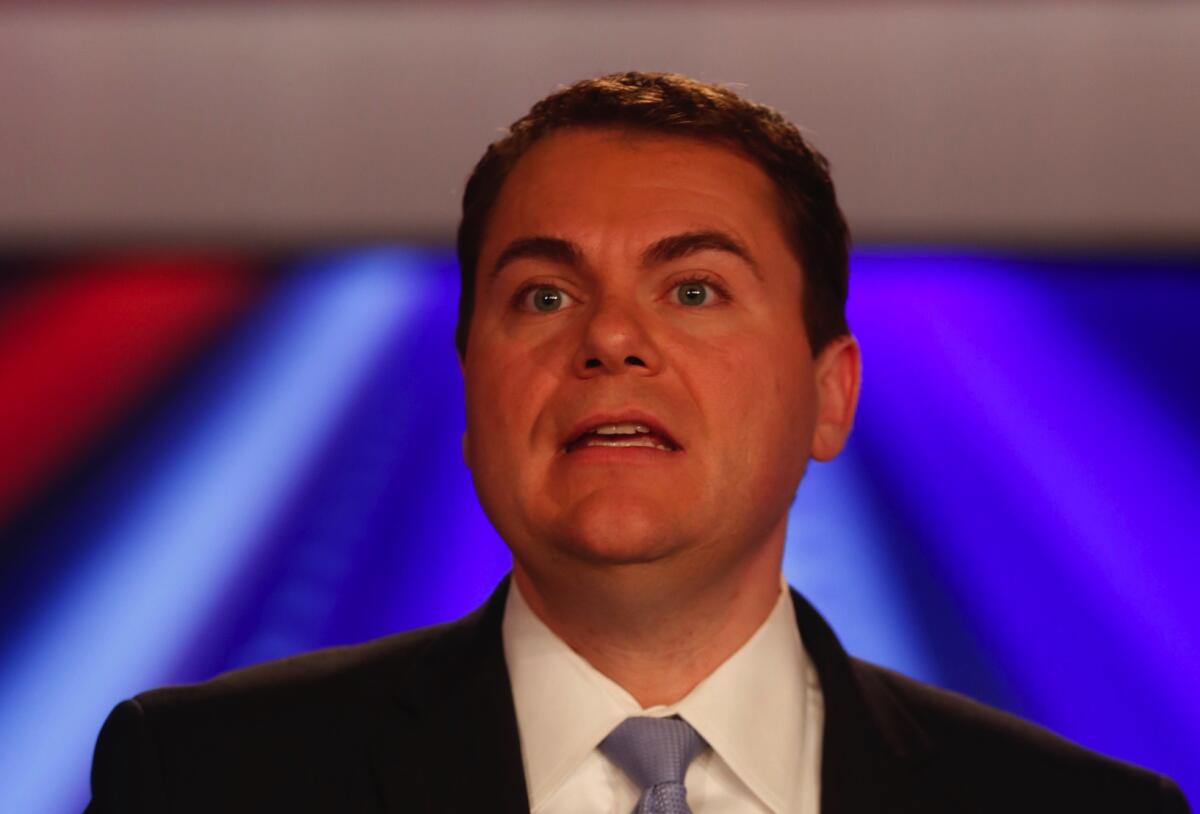Backers to hold off on pension ballot measures this year

Former Republican congressional candidate and former San Diego Councilman Carl DeMaio.
- Share via
Reporting from Sacramento — Proponents of a pair of initiatives to curb retirement benefits for public employees said Monday they will not go forward with their ballot measures this year.
Instead, former San Diego Councilman Carl DeMaio and former San Jose Mayor Chuck Reed said they will seek to qualify their measures in 2018, when they believe they’ll face a more favorable political landscape.
“We need pension reform to protect our education system and vital public services from these fast-growing burdens,” DeMaio, a Republican, and Reed, a Democrat, wrote in an email to supporters. “Although our polling today shows continued strong public support for pension reform, we believe 2018 will provide an even better environment for substantial reform as rising retirement costs further squeeze their schools and local agencies budgets.”
Join the conversation on Facebook >>
DeMaio and Reed filed two ballot measures last year aiming to shrink public employee pensions: One would have required voter approval for defined-benefit pensions for new workers after 2019, and the other would have limited what the government could pay toward new employees’ retirement benefits.
------------
FOR THE RECORD
1:50 p.m.: In an earlier version of this post, the caption said DeMaio was a congressman. He is a former Republican congressional candidate.
------------
Labor unions were quick to voice their opposition to the proposals and were expected to spend heavily against them.
DeMaio, in an interview Monday, said the measures’ backers decided to hold off this year in part because they were awaiting the result of a U.S. Supreme Court case on mandatory union fees. If justices decide to strike down such fees, it could deal a major blow to labor unions.
“If labor unions aren’t able to spend unlimited amounts of money, that certainly heightens the chance of [pension] reform,” DeMaio said.
He also said instability in the stock market could make their proposals more palatable.
“We believe that as the markets begin to show distress, taxpayers will see it’s not fun seeing their 401(k)s go down and then have to turn around and write bailout checks for government pension programs,” DeMaio said.
This isn’t the first time supporters of pension overhaul have delayed their path to the ballot. In 2012, a Republican-led group abandoned its initiative campaign; in 2014, Reed pulled his own statewide initiative. In both cases, proponents accused Atty. Gen. Kamala Harris of crafting a politically slanted summary that would dissuade voters from the measures.
Reed sued Harris over her title and summary of his measure in 2014. A judge ruled her description was fair.
Dave Low, chairman of Californians for Retirement Security, a coalition of labor groups opposing the proposals, said Reed and DeMaio’s efforts “failed because they were too extreme, would have cost taxpayers billions of dollars, and would have destabilized our state’s two retirement systems, CalPERS and CalSTRS.”
“We are skeptical that donors will have any confidence in these two failed politicians who have repeatedly bungled efforts to put their poorly written efforts to gut retirement security for millions of Californians on the ballot,” Low said in a statement. “They can be assured that any scheme they cook up for 2018 will meet the same fate of their previous efforts because we will fight it with our full arsenal.”
Follow @melmason for more on California government and politics.
ALSO
14 years in, Brown shows no sign of losing political muscle
Kamala Harris should take bolder action on police shootings, civil rights advocates say
Amount of lobbying done in the shadows is growing, California ethics officials agree
More to Read
Get the L.A. Times Politics newsletter
Deeply reported insights into legislation, politics and policy from Sacramento, Washington and beyond. In your inbox twice per week.
You may occasionally receive promotional content from the Los Angeles Times.











